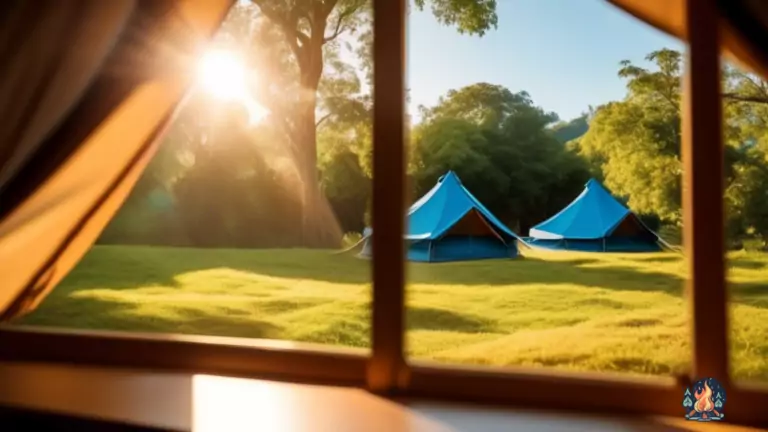Common Issues With RV Generators And How To Troubleshoot
by Kevin Fairbanks • Updated: January 21, 2024
Don’t let RV generator issues ruin your camping adventures! Learn how to troubleshoot common problems like a pro and keep the power flowing. Read now for expert RV generator troubleshooting tips!

Are you tired of your RV generator causing you headaches and leaving you without power when you need it most? Well, fear not, because this article is here to save the day! We understand that dealing with generator issues can be frustrating, but don’t worry, we’ve got your back.
In this article, we will explore the most common issues that RV generators face and provide you with some simple troubleshooting tips to get you up and running again in no time.
So, picture this: you’re out in the wilderness, ready to enjoy a nice relaxing camping trip, and suddenly, your RV generator decides to go on strike. It’s as if the generator has a mind of its own and has chosen the worst possible time to give up on you. But fear not, intrepid adventurer, because we’re here to help you navigate through these treacherous waters.
Whether you’re experiencing a lack of power output, starting problems, fuel issues, overheating, or electrical malfunctions, we’ve got the solutions you need. So grab your wrench, put on your troubleshooting hat, and let’s dive into the world of RV generator problems and how to tackle them head-on!
Lack of Power Output
If your RV generator isn’t providing enough power to run your appliances, don’t worry, troubleshooting this issue is easier than you think!
First, check to make sure that you didn’t accidentally plug in your toaster, blender, and hairdryer all at the same time. I mean, come on, your RV generator isn’t powerful, but it’s not a superhero. It can only handle so much. So, maybe try unplugging some of those unnecessary gadgets and see if that solves the problem.
If that doesn’t do the trick, it’s time to move on to the next step.
Check the fuel level in your generator. I know, I know, you’re probably thinking, "Wow, I’m a genius. Of course, I already checked that." But hey, sometimes the best of us forget the simplest things. So, double-check and make sure you actually have fuel in there.
If you don’t, well, that might explain why your generator isn’t producing enough power. And if you do have fuel, but it’s been sitting there for months, it might be time to replace it. Just like milk, fuel has an expiration date too. So, don’t expect your generator to work miracles if you’re pouring in some stale gasoline.
Starting Problems
When it comes to starting problems with RV generators, sometimes it feels like trying to light a match in a hurricane. It can be incredibly frustrating when you’re ready to hit the road and your generator just won’t start. But fear not, intrepid traveler, for there are a few common starting issues that you can troubleshoot on your own.
So grab your toolkit and let’s get to work!
- Check the fuel level: Is your generator running on empty? Make sure you have enough fuel in the tank before you start troubleshooting. Otherwise, you’ll be left feeling like a fish out of water, or a generator without any gas.
- Inspect the spark plug: A faulty spark plug can be a real buzzkill when it comes to starting your generator. Take a look at the spark plug and see if it needs cleaning or replacing. Just remember, if you’re not a fan of getting your hands dirty, this might not be the task for you.
- Examine the air filter: A clogged air filter can suffocate your generator’s engine and make it difficult to start. Take a peek at the air filter and clean or replace it if needed. Trust me, your generator will thank you.
- Check the battery: If your generator has a battery, make sure it’s charged up and ready to go. It’s like giving your generator a jolt of energy to get it going. And who doesn’t need a little pick-me-up every now and then?
- Inspect the fuel line: A clogged fuel line can be the culprit behind your starting woes. Take a look at the fuel line and make sure it’s clear of any debris or blockages. It’s like giving your generator a breath of fresh air, or in this case, fuel.
So there you have it, fellow adventurer! With a little troubleshooting and a dash of humor, you’ll be starting your RV generator like a pro in no time.
Safe travels!
Fuel Issues
One potential hurdle that RV enthusiasts often encounter is dealing with fuel problems in their generators. Now, I know what you’re thinking, "Why can’t these generators just run on good vibes and positive energy?" Trust me, I wish they could too! But unfortunately, they need fuel to keep chugging along.
So, let’s talk about some common fuel issues and how to troubleshoot them.
First off, if your generator is having trouble starting or is sputtering and stalling, it could be a sign of a clogged fuel filter. Just like us after a big meal, sometimes generators can get a little backed up. The solution? Give that fuel filter a good cleaning or replace it if necessary. It’s like giving your generator a nice, refreshing colon cleanse. Ah, the relief!
Another fuel issue that can leave your generator feeling a little sluggish is contaminated fuel. You see, gasoline can go bad over time, just like that carton of milk that’s been sitting in your fridge for months. So, make sure you’re using fresh fuel and if you suspect it’s gone bad, drain the tank and refill it with some fresh juice. Your generator will thank you with a purr like a contented kitten.
So, the next time you’re faced with fuel problems in your RV generator, don’t panic. Just remember to keep your fuel filter clean and your fuel fresh. With a little bit of troubleshooting and a whole lot of humor, you’ll have that generator running smoothly in no time.
Happy trails, my friend!
Overheating
To prevent your RV generator from overheating, you should regularly clean the air filters and ensure proper ventilation. Just like you wouldn’t want to breathe through a clogged nose, your generator also needs to breathe freely.
So, take a moment every now and then to give those air filters a little TLC. Trust me, your generator will thank you for it. And while you’re at it, make sure there’s enough space around your generator for it to get some fresh air. Don’t suffocate it by squeezing it into a tight space. After all, who wants to be cramped up in a tiny room with no windows? Your generator definitely doesn’t!
Now, let’s talk about the importance of keeping an eye on your generator’s temperature gauge. Just like you wouldn’t want to be caught in a sauna without any way to cool down, your generator also needs to stay within a safe temperature range.
If you notice that the temperature is skyrocketing, it’s time to take action. First things first, check if the cooling fan is working properly. If it’s not, you might need to give it a little nudge or even replace it. And if that doesn’t solve the problem, it’s time to call in the professionals. Don’t worry, they’ll know exactly what to do to keep your generator from turning into a hot mess.
Electrical Malfunctions
Electrical malfunctions in RV generators can give you a shocking surprise. Literally! When your generator starts acting up, it’s important to know how to troubleshoot the issue.
Here are some common electrical malfunctions and how to tackle them:
- Blown fuses: If your generator suddenly stops working, it might be a blown fuse. Don’t worry, it’s an easy fix! Just locate the fuse box (it’s like playing hide and seek, but with electricity) and check if any of the fuses are burnt out. If you find one, replace it with a new one and voila! Power will be restored, and you can continue binge-watching your favorite shows in peace.
- Wonky wiring: Sometimes, the wires in your generator can get all tangled up, just like that ball of yarn your cat destroyed. To fix this, you’ll need to channel your inner detective and follow the wires to see if any of them are loose or damaged. If you find any loose connections, tighten them up (no one likes a loose screw) and if you spot any damaged wires, replace them. It’s like giving your generator a much-needed spa day – it’ll thank you with a steady supply of electricity.
- Mysterious sparks: If you see sparks flying from your generator, don’t panic! It’s just trying to show off its firework skills. But seriously, sparks can be a sign of a bigger problem, like a short circuit. To tackle this, turn off the generator immediately (safety first, folks) and inspect the wiring for any exposed or frayed parts. If you find any, cover them up with electrical tape or replace the damaged section. Remember, your generator is not auditioning for a role in a sci-fi movie, so sparks are a definite no-no.
So, the next time your RV generator decides to play tricks on you, remember these troubleshooting tips. With a little bit of patience and a dash of humor, you’ll be back to enjoying your RV adventures in no time.
And who knows, you might even become an honorary electrician along the way!
Frequently Asked Questions
How often should I service my RV generator to prevent lack of power output?
To prevent a lack of power output, you should service your RV generator regularly. Don’t neglect it like that cousin who always forgets birthdays! Aim for servicing every 6 months or after 100 hours of use.
What could be causing my RV generator to have starting problems even after regular maintenance?
Having trouble starting your RV generator, huh? Well, even with regular maintenance, pesky problems can still pop up. It could be a clogged fuel filter, a weak battery, or maybe even a stubborn gremlin playing tricks on you. Time to put on your troubleshooting hat!
Are there any specific fuel additives I should use to prevent fuel issues in my RV generator?
To prevent fuel issues in your RV generator, it’s a good idea to use fuel additives specifically designed for generators. These additives can help keep your fuel clean, prevent clogs, and ensure smooth performance. Don’t worry, they’re easy to use and worth the investment!
What are some common signs of overheating in an RV generator, and how can I prevent it?
If your RV generator is overheating, you might notice strange smells, smoke, or even flames (yikes!). To prevent this fiery fiasco, make sure your generator has proper ventilation and isn’t overloaded. Safety first, folks!
How can I determine if the electrical malfunction in my RV generator is due to a faulty wiring connection or a damaged component?
Are you tired of playing the guessing game with your RV generator’s electrical malfunction? Don’t worry, Sherlock! To determine if it’s faulty wiring or a damaged component, follow the trail of clues and use your deductive powers to crack the case!

Hi, I’m Kevin, a lifelong camping enthusiast and the voice behind Campfire Discoveries. From tent to RV to cabin camping, I’ve explored it all. Join me as we share stories and tips around the campfire, deepening our connection with the great outdoors.
Keep Reading
-
Keeping Cool Inside: Tent Ventilation Tips For Hot Weather
Discover the best tent ventilation tips to keep cool during hot weather while camping. Don’t let the heat spoil your trip – click here to learn how to stay comfortable inside your tent!
-
Choosing The Perfect Family Tent: A Comprehensive Guide
Looking for the perfect family tent? Our comprehensive guide has everything you need to know about family tent selection. From size to durability, we’ve got you covered. Click now and find your ideal family tent today!
-
Delicious Dutch Oven Cooking: Techniques And Recipes
Learn the art of delicious Dutch oven cooking! Discover mouthwatering techniques and recipes that will leave you craving for more. Start your culinary adventure today!



